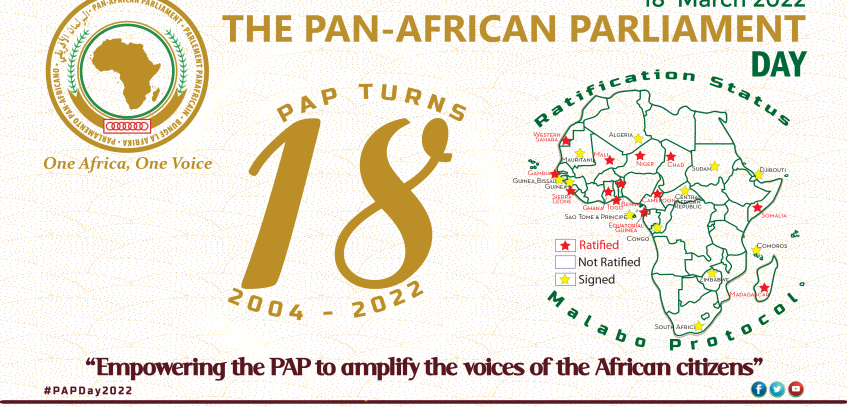Today marks the PAP Day, which commemorates 18 years since the inauguration of the first Parliament of the Pan-African Parliament (PAP) on 18 March 2004 at the African Union (AU) headquarters in Addis Ababa. First launched in 2021, this year’s commemoration is held under the theme: “Empowering the PAP to amplify the voices of the African citizens”
The PAP Day celebration reignites a conversation about the vision and purpose of the institution, which can be traced directly to the Pan-African ideals of cooperation and unity among African states. These ideals inspired the signing of the Treaty Establishing the African Economic Community (the Abuja Treaty) on 3 June 1991, and the adoption of the Sirte Declaration of 1999.
The latter called for speedy establishment of the institutions provided for in the Abuja Treaty, and the PAP was envisioned as a platform from which the African peoples, and not states or leaders, could be represented in the decision-making processes affecting the continent. Indeed, the PAP Protocol enjoined the institution, among other things, to facilitate effective implementation of the AU’s policies and objectives.
At its 39th meeting in October 2021, the Executive Council of the AU called on Member States that have not done so to sign and ratify the Protocol to the Constitutive Act of the African Union relating to the Pan-African Parliament (also known as the Malabo Protocol) adopted in 2014 by the Assembly of Heads of State and Governments. The Malabo Protocol is intended to extend the powers of the PAP into a fully-fledged legislative organ. It requires a minimum of 28 countries to ratify it before it comes into force.
The Republic of Niger recently became the 13th AU Member state to ratify the 2014 PAP Protocol. Niger joins Benin, Cameroon, Chad, Equatorial Guinea, Gambia, Ghana, Madagascar, Mali, Sahrawi Arab Democratic Republic, Sierra Leone, Somalia and Togo as the African countries that have so far heeded the call to empower the continental Parliament.
PAP is one of the nine organs of the AU with the mandate to promote economic and social integration through making laws. As it stands, its mandate extends to consultation, and playing an advisory and oversight role for all AU organs pending the ratification of its protocol.
The PAP Day was launched to serve as a reminder to African citizens of the potential of the Parliament, intended as a platform for people from all African states to be involved in discussions and decision-making on the problems and challenges facing the continent. The day is also meant to reminder African leaders of their commitment to empower the continental representation of the peoples of Africa.
Stakeholders, including Parliamentarians, Speakers of regional Parliaments, civil society organisations and media representatives, gathered at the launch of the PAP Day in 2021 were unanimous in their assessment that the integration of the African continent will only be achieved through constant interactions and involvement of the grassroots in the affairs of the AU.
Mr. Vipya HARAWA, Clerk of the PAP says that formal celebrations of the PAP Day will be held upon resumptions of Parliamentary activities underpinned by the upcoming elections of the Bureau and Bureaux of the PAP. The event will include, among others, the launch of the PAP compendium of the 3rd Parliament resolutions, recommendations and declarations disseminated.








